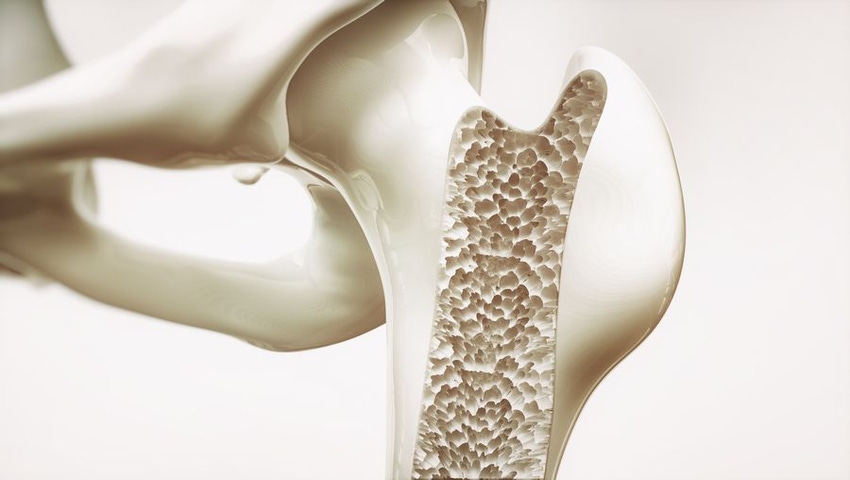Calcium and vitamin D are known mostly for their benefits to bone health. But the benefits of this dynamic duo are wide-reaching, each supporting the other to improve many aspects of overall health.
November 22, 2017

Calcium and vitamin D are known mostly for their benefits to bone health. But the benefits of this dynamic duo are wide-reaching, each supporting the other to improve many aspects of overall health.
Calcium
“Calcium is the most abundant mineral found in the body,” said Alan Rillorta, director of marketing, AIDP Inc.
Most calcium in the body is found in the bones and teeth, but per the National Institutes of Health (NIH), calcium in the circulatory system, extracellular fluid, muscle and other tissues is critical for mediating vascular contraction and vasodilatation, muscle function, nerve transmission, intracellular signaling and hormonal secretion.
“Calcium plays a role in bone density, nerve signaling, muscle contraction, blood clotting, keeping a rhythmic heartbeat and regulating blood pressure via vascular contraction and vasodilation,”1 Rillorta noted, adding calcium deficiency can lead to issues such as rickets in children and osteoporosis in adults.
Osteoporosis affects roughly 75 million people in Europe, the United States and Japan, along with more than 200 million women globally, according to the International Osteoporosis Foundation, making the condition a global public health concern.
Most people get their calcium from the same grocery aisle. “The greatest amount of calcium in the diet comes from milk and other dairy foods,” said Lorraine Olguin, sales and marketing, PAT Vitamins Inc. “We all have been told to drink more milk on a daily basis as we grew up.”
However, Todd Johnson, senior director of marketing at Balchem Human Nutrition and Pharma, Albion Minerals, pointed to a variety of foods to achieve adequate calcium intake, including a mix of dairy, green leafy vegetables, soybeans, fish and calcium-fortified foods such as orange juice, cereal and baked goods. “Individuals who cannot achieve the RDA [recommended daily allowance] of calcium should investigate a high-absorption calcium supplement,” he said. RDA for calcium is 1,000 mg/d for adult males and 1,200 mg/d for adult females.
Calcium supplementation is also important for those following a vegan diet, those who are lactose-intolerant or living with irritable bowel disorder (IBD) or celiac disease, those with osteoporosis and those taking corticosteroids long-term, Johnson said.
Vitamin D
Vitamin D has been linked to many health benefits, including reduced risk of fracture in elderly people,2 increased muscle strength and prevention of hip fracture,3 reduced risk of heart attack and other issues related to cardiovascular disease (CVD),4 and reduced risk of developing multiple sclerosis,5 type 1 diabetes,6 and other autoimmune disorders.
Unfortunately, vitamin D status is lagging in many parts of the world, even in sun-abundant regions such as India, China, the Middle East and Africa.7 Vitamin D status is improved by fortification of milk in North America, though vitamin D insufficiency is still common. Risk groups for vitamin D deficiency include young children, pregnant women, elderly and immigrants.
“Vitamin D is produced primarily by sunlight through the skin,” Johnson said. However, achieving adequate vitamin D levels via sunlight isn’t’ as simple as it seems.
“While it is true that exposure to the sun triggers vitamin D synthesis in the body,” said Saumil Maheshvari, business development, Orgenetics. “it may sometimes not be enough. Depending on the amount of melanin in the skin and the location of the individual on the planet, different levels of sun exposure may be required to get an adequate amount.”
Additionally, there are limited dietary sources of vitamin D. Johnson pointed to fish, mushrooms, fortified milk and fortified cereals for vitamin D content.
For these reasons, supplementation with vitamin D is essential in regions with weather that prevents sunlight exposure, as well as for those who limit exposure to the sun or regularly use sunscreen.
Supporting Calcium
Calcium supplementation isn’t as easy as taking a pill. Certain factors need to be taken into consideration to ensure calcium is properly utilized and excess calcium isn’t causing unwanted health effects.
Assisting calcium in its area of highest demand—bone support—is vitamin D.
“Vitamin D works together with the parathyroid hormone to balance calcium and phosphorus absorption,” Johnson said. “Without vitamin D, calcium is poorly absorbed, causing the body to react to a calcium deficiency, and reducing calcium stores in the body. This, in turn, may cause brittle bones and teeth, or the onset of osteoporosis.”
Vitamin D aids with bone growth and bone remodeling by osteoblasts (bone builders) and osteoclasts (bone removers), Rillorta added.
“Calcium can only reach its full bone-building potential if your body has enough vitamin D,” Olguin said. “Basically you need to have sufficient intakes of both calcium and vitamin D to achieve the proper absorption benefits for your bones.”
An important consideration of calcium supplementation is the effect of excess calcium intake. Excess calcium can result in hypercalcemia (high blood serum calcium levels) which can be induced by high intake of calcium or vitamin D, but can also be caused by conditions such as malignancy and primary hyperparathyroidism.8 Hypercalcemia has been associated with weight loss, polyuria (abnormally large urine volume), heart arrhythmia, fatigue and soft tissue calcification.9
Additionally, calcium supplementation has been linked to increased risk of myocardial infarction10 and cardiovascular mortality,11 which can cause calcification and hardening of the arteries, known as atherosclerosis, in cases of excess calcium levels. Certain nutrients such as vitamin K2 are stepping into the spotlight to address such concerns by activating matrix Gla protein (MGP) that inhibits arterial calcium deposits.12
Calcium and vitamin D intake and deficiency issues will continue to challenge public health, but optimized supplementation and fortification can help change the tide, especially as some specialty ingredients have been designed to improve absorption of calcium to address the need for stronger bones, healthy hearts and overall improved well-being.
For a list of references, email [email protected].
About the Author(s)
You May Also Like






.png?width=800&auto=webp&quality=80&disable=upscale)